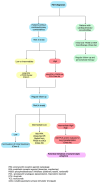Towards a Better Prognosis in Patients with Systemic Sclerosis-Related Pulmonary Arterial Hypertension: Recent Developments and Perspectives
- PMID: 39407897
- PMCID: PMC11477739
- DOI: 10.3390/jcm13195834
Towards a Better Prognosis in Patients with Systemic Sclerosis-Related Pulmonary Arterial Hypertension: Recent Developments and Perspectives
Abstract
Precapillary pulmonary hypertension (PH) is a significant complication of systemic sclerosis (SSc). It represents one of the leading causes of morbidity and mortality, correlating with a significantly dismal prognosis and quality of life. Despite advancements in the management of patients with pulmonary arterial hypertension associated with SSc (SSc-PAH), no significant improvement has been reported in survival of patients with precapillary SSc-PH associated with extensive lung parenchyma disease. International expert consensus and guidelines for the management of PH recommend annual screening of SSc patients for early detection of pre-capillary PH. The implementation of screening algorithms capable of identifying patients with a high likelihood of developing PH could help limit unnecessary right-heart catheterization procedures and prevent significant delay in diagnosis. Furthermore, early initiation of up-front combination targeted therapy in patients with PAH has shown increase in survival rates, indicating that timely and aggressive medical therapy is key for stabilizing and even improving functional class, hemodynamic parameters and 6 min walking distance (6MWD) in this population. Further research is warranted into the benefit of PAH-targeted therapies in patients with PH associated with lung disease. Lastly, we discuss the potential role of immunosuppression using biologic agents in the therapeutic management of precapillary PH in SSc patients.
Keywords: pharmacotherapy; precapillary pulmonary hypertension; prognosis; screening; survival; systemic sclerosis.
Conflict of interest statement
The authors declare no conflicts of interest.
Figures
References
-
- Humbert M., Kovacs G., Hoeper M.M., Badagliacca R., Berger R.M.F., Brida M., Carlsen J., Coats A.J.S., Escribano-Subias P., Ferrari P., et al. 2022 ESC/ERS Guidelines for the Diagnosis and Treatment of Pulmonary Hypertension. Eur. Heart J. 2022;43:3618–3731. doi: 10.1093/eurheartj/ehac237. - DOI - PubMed
Publication types
LinkOut - more resources
Full Text Sources


